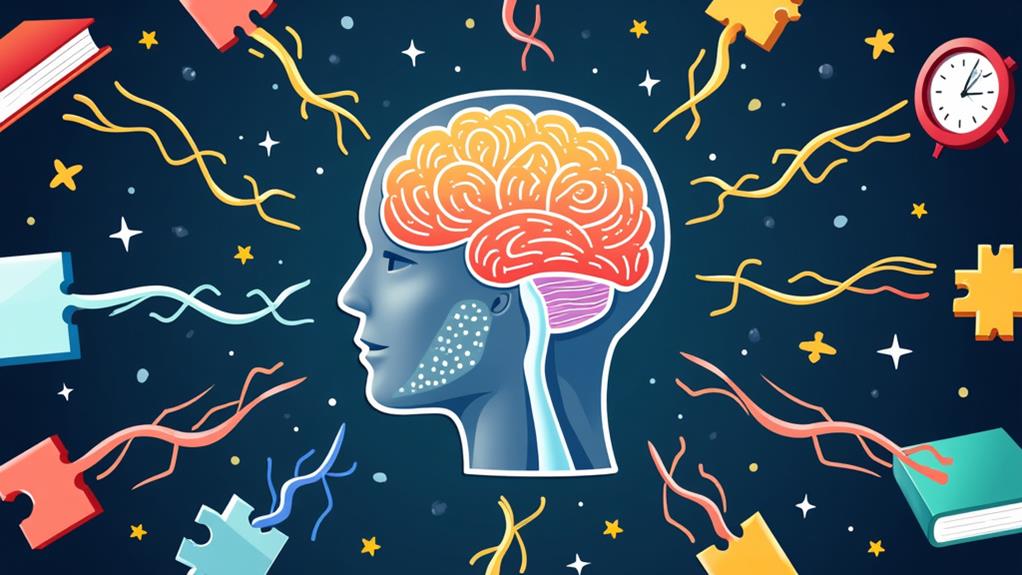You've likely experienced moments where remembering crucial details felt like a daunting task. However, there are proven strategies that can significantly enhance your memory capabilities. By implementing a few simple yet powerful techniques into your daily routine, you can unlock a more efficient memory system. Stay tuned to discover practical tips that can transform how you retain and recall information, ultimately leading to improved cognitive abilities and enhanced learning outcomes.
Understanding Memory Basics

To understand how memory works, it's essential to grasp the fundamental processes involved. Memory is the ability to store, retain, and recall information. It involves three main stages: encoding, storage, and retrieval.
Encoding is the process of converting information into a form that can be stored in the brain. This can be done through various means such as visual imagery, semantic encoding, or acoustic encoding.
Once information is encoded, it moves to the storage stage where it's held for later retrieval. Storage can occur in different areas of the brain depending on the type of memory being formed.
Finally, retrieval is the process of accessing stored information when needed. This can be influenced by various factors like the strength of the memory trace, emotional significance, and environmental cues.
Understanding these basic processes can help you improve your memory skills and develop effective strategies for learning and retaining information.
Adopting Effective Study Techniques
Understanding how to adopt effective study techniques is crucial for enhancing your memory and learning capabilities. To begin, organize your study materials in a way that makes sense to you. Use color coding, diagrams, or outlines to visually represent key points.
When studying, actively engage with the material by summarizing information in your own words or teaching it to someone else. This reinforces understanding and retention.
Consider breaking down study sessions into shorter, focused intervals. The Pomodoro Technique, for example, involves studying for 25 minutes, then taking a 5-minute break. Repeat this cycle to maintain focus and prevent burnout. Additionally, find a quiet, well-lit study space to minimize distractions and optimize concentration.
Another effective technique is practicing retrieval. Test yourself on the material regularly, whether through flashcards, quizzes, or explaining concepts aloud. This reinforces memory recall and strengthens connections in your brain.
Lastly, vary your study routine to prevent monotony and keep your brain engaged. By adopting these techniques, you can improve your memory and enhance your learning experience.
Improving Sleep Quality

Improving Sleep Quality plays a vital role in optimizing memory and cognitive function. When you consistently get quality sleep, your brain can effectively consolidate and store information, leading to better recall and improved learning capabilities.
Aim for 7-9 hours of uninterrupted sleep each night to allow your brain to undergo essential memory processes during the various sleep cycles.
To enhance your sleep quality, establish a relaxing bedtime routine. Wind down by avoiding screens, engaging in calming activities like reading or meditating, and creating a comfortable sleep environment.
Keep your bedroom dark, quiet, and at a comfortable temperature to promote deep, restful sleep.
Additionally, strive to maintain a consistent sleep schedule by going to bed and waking up at the same time every day, even on weekends. This helps regulate your body's internal clock, promoting better sleep quality over time.
Prioritize sleep as a crucial component of memory enhancement and cognitive function improvement in your daily routine.
Incorporating Mindfulness Practices
Amid the hustle and bustle of daily life, incorporating mindfulness practices can offer a powerful tool for enhancing memory and cognitive function. By bringing your attention to the present moment without judgment, mindfulness can help reduce distractions and improve focus, making it easier to encode and retrieve information.
Through practices like mindful breathing, body scans, or meditation, you can train your brain to be more attentive and less prone to forgetfulness. Engaging in mindfulness regularly can also reduce stress, which is known to impair memory.
Stress hormones like cortisol can negatively impact the hippocampus, a brain region crucial for memory formation. By cultivating a mindful awareness of your thoughts and feelings, you can better manage stress and protect your memory from its detrimental effects.
Incorporating mindfulness practices into your daily routine doesn't have to be time-consuming. Even short moments of mindfulness throughout the day can make a significant difference in how well you remember and process information.
Exercising Regularly for Memory Boost

To enhance your memory and cognitive function, regular exercise can serve as a powerful ally. Engaging in physical activity not only benefits your body but also has a significant impact on your brain health. When you exercise, your heart rate increases, pumping more oxygen and nutrients to your brain. This boost in blood flow helps improve memory and cognitive function.
Studies have shown that regular exercise can stimulate the production of chemicals that enhance the health of brain cells. It can also promote the growth of new blood vessels in the brain, leading to improved overall brain health.
Additionally, exercise has been linked to increased levels of brain-derived neurotrophic factor (BDNF), a protein that supports the growth, function, and survival of brain cells.
Whether it's going for a brisk walk, hitting the gym, or practicing yoga, aim to incorporate at least 150 minutes of moderate exercise into your weekly routine. By making exercise a regular part of your life, you can boost your memory and cognitive abilities in a natural and effective way.
Utilizing Memory Aids and Tools
Regularly employing memory aids and tools can significantly enhance your ability to retain and recall information effectively.
By incorporating these tools into your daily routine, you can optimize your memory retention and improve your overall cognitive function.
Here are three memory aids and tools that can help you boost your memory:
- Mind Mapping: Creating visual diagrams to organize information can help you better understand and remember complex concepts.
- Mnemonic Devices: Using acronyms, rhymes, or associations can make it easier to recall information by linking it to something more memorable.
- Digital Apps: Utilizing apps designed for memory training and organization can provide interactive exercises and reminders to keep your memory sharp.
















